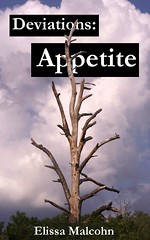By The Numbers
on BlogTalkRadio tonight at 6:30 PM Eastern here.
(The interview will then become available as a podcast.)
The Stats, So Far
In less than a week and as of 10:07 AM Eastern on May 28, 2009, Covenant has been downloaded 163 times over at Manybooks.net.
In less than a day since being uploaded, Appetite has been downloaded 71 times from Manybooks.net, and has gotten one more download as I've been writing this entry.
In less than three weeks (since May 8), my own Deviations website has received almost 350 visits (almost 600 page views) from 32 countries/territories on six continents (all but Antarctica).
I am thrilled and grateful to all the readers out there who are getting to know my work!
The Madness To My Method
(continued...)
Recently I posted this on a discussion thread, answering someone who was considering self-publishing through Amazon's CreateSpace:
What I'm leery of is that through CreateSpace and BookSurge, Amazon would control distribution of both paper and electronic formats. For example, two of the e-book formats I offer for my own work are MOBI and PRC, for use with for Kindle or Kindle-compatible readers. To convert to those formats, I used readily-available freeware, and people who want those formats can download the files directly from my website anywhere in the world (and now from Manybooks.net, which offers even more formats). In contrast, if Amazon published my book(s) through BookSurge or CreateSpace, they would have the exclusive right to format the work for Kindle (which Amazon owns). That means that they would control not only distribution there, but people wanting electronic copies of the book would have to buy it from Amazon exclusively. Distribution rights are becoming at least as big now as rights concerning ownership of text. There are self-publishing outfits, like Lulu, that will print books without taking distribution rights -- though one Lulu package gives them those rights.
As of February 2009, Kindle was still not being sold overseas, nor were downloads of new work available from Amazon overseas, according to this New York Times blog entry.
Comments following the Times blog entry refer to international laws as being part of the problem.
Exclusive control can also lead to unresolved technical problems. See, for example, this post.
Given the rate at which software changes, by retaining control of my work and its distribution, I also have full freedom to upgrade my files if I think it's necessary.
Here's a primer on what can happen to authors' rights, at Simon & Schuster, for example.
Also check out this post about Amazon's new Encore program....
All six of my books are registered with the U.S. Copyright Office (the final two are being processed, but registration begins the day the books, forms, and fees are received). All six have ISBNs that I register with Bowker (the exclusive U.S. Registration Agency for ISBNs) prior to release. Currently, those ISBNs do not get me into major distribution channels, but they do get me into the system.
Lightning Source works with publishers and with individual authors solely as a printer. In this case, the author becomes the publisher. I'm currently looking into what they have to offer, particularly because they are linked to global distribution channels. Needless to say, I'm still learning my way around a constantly moving target.
I also recently posted this comment on Deatri King-Bey's blog entry, Unrealistic Expectations, in which she listed unrealistic expectations held by writers and asked her readers for more. I wrote:
1. Do not assume that a publisher or agent will accept your work, even if it is of high quality. “Fascinating premise, excellent writing, but we don’t think it would sell” is not an unusual rejection. Small presses are more likely to accept works that “don’t fit.”
2. Do not assume you will get money from a small press. Check them carefully and re-check regularly. Take, for example, what happened to romance publisher Triskelion here, where author properties are being held up in bankruptcy court; or my own cautionary tale here.
3. Do not assume that publishing behaves like other industries and tries to keep up with inflation. The same major magazine that bought a story of mine in 1984 for $450 recently bought a story of just about the same length for … $450.
4. Do not assume that to be a full-fledged writer, you must concentrate only on writing and writing courses. See author Crawford Killian’s excellent post, “The Education of a Writer,” here.
5. And read Marge Piercy’s powerful and empowering poem, “For the young who want to,” here.
6. Do not assume the industry makes any sense at all. I made $350 in 1986 from a sonnet (14 lines) and $375 in 2007 from a 500-word article, and have gotten contributor’s copies for pieces on which I’ve worked much harder.
7. Do not assume that being highly successful guarantees anything. Borders chose not to stock the latest novel by bestselling author Lois McMaster Bujold (who was Guest of Honor at last year’s Worldcon). Read about it here.
8. Do not assume that freebies don’t count. My book reviews for one magazine that paid only in contributor’s copies (and copies of the books I reviewed) were responsible for getting me a $30/hr writing gig with a major consulting firm back in the late 80s.
9. Do not assume that formatting doesn’t count. Read William Shunn’s formatting guide here. THEN check your individual market to see what its editor wants, because not everyone follows the standard. One story (for which I was paid $125 last year) had to be submitted in single-spaced 14-point Arial. I’ve heard editors on a panel say they’ve rejected works because the people submitting them did not follow directions. If you use the print version of Writer’s Market and the market you’re interested in has a website, check the website. If the print and web specs disagree (and I’ve found instances where they have), don’t be afraid to contact the publisher for the correct instructions.
10. Read, learn, research, do the work, and keep the faith. Heaven knows I’m still learning, and I feel as though I’m perpetually behind the curve.
I consider myself lucky. I came into writing with no expectations — my characters needed voice and I needed to give it to them. I started submitting stories when I was barely out of grade school, sending manuscripts by “Special Fourth Class” (what is now called Media Mail) because that’s all I could afford with my allowance. I didn’t want to be a writer “when I grew up” because I already was one, and whatever work I did supported the writing. I’ve been published (and collecting rejections) since the 1970s and still love what I’m doing.
 |  |
Vol. 2, Deviations: Appetite
Free downloads of both volumes here.
 | Go to Manybooks.net to access Covenant and Appetite in even more formats! |











0 Comments:
Post a Comment
<< Home